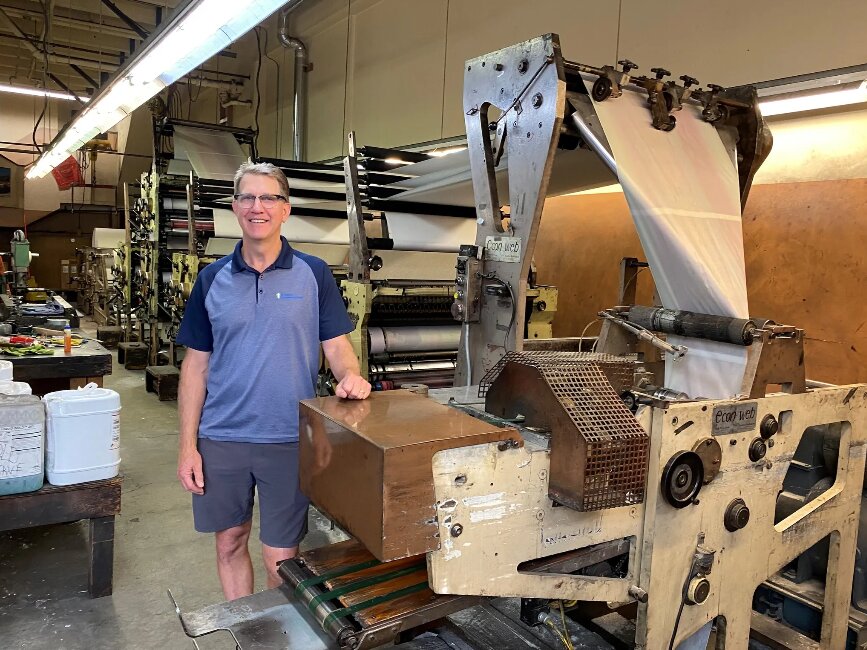
Phil Brown would like to save the free press.
Especially the one on the first floor of his historic building in Seattle’s Pioneer Square neighborhood.
Brown’s family acquired the four-unit, offset printing press in 1979 and used it to print the Seattle Daily Journal of Commerce newspaper until July.

Since then Brown, the family-owned paper’s CEO and publisher, has puzzled over what to do with the machinery — still loaded with paper, shiny with ink and showing a crossword puzzle from its last run.
An artist is interested in making furniture out of it but Brown called me to ask if I knew of any newspapers that would like it, for free, to keep the trusty old press rolling.
“I’d love to see it being used, but it’s hard to say,” he said while showing me around the idle print shop opening onto Post Alley, frozen in time with an open barrel of ink and tools spread across its workbench.
“I don’t know if it’s really practical anymore,” he said. “I think the only way they can do it would be if some group were running several publications off of the one press.”
His paper’s 1,500 daily copies are now printed by The Seattle Times in Kent.
This is a common situation that speaks to changes and challenges in the newspaper industry.
With the industry shrinking and evolving, and publishers looking for ways to keep going with rising production costs and less ad revenue, most small papers outsource printing.
Dailies are printing fewer editions and the large, debt-burdened newspaper chains are closing presses, consolidating production and selling the real estate.
This is creating a print capacity crisis in some places, where smaller papers that still depend on print for most of their revenue are scrambling to find a place to print.
In Washington, the family-owned dailies continue to operate presses and Sound Publishing, a chain owned by a Canadian media baron, recently opened a new press in Lakewood.
The Seattle Times sold its Bothell print facility in 2020 and now prints at its Rotary Offset Press facility in Kent. Its Yakima press closed in 2021 and the Times-owned Yakima Herald-Republic is now printed in Walla Walla.
Brown said it was no longer cost effective for him to print just a single publication. Keeping the press going was also a worry that could keep him up at night, especially as it becomes harder to find parts and service people. He had to let two production employees go but continues to employ about 20 people.
The press situation is especially acute in Colorado, where the newspaper giant Gannett in August shuttered a press in Pueblo that was printing 46 weeklies, 10 monthlies and at least four dailies.
About 80 publications were affected, according to Carol Wood, business innovation director at the Colorado News Collaborative.
Some ceased printing, one went out of business and at least three other papers were folded into other publications, she said.
Some papers are traveling across the state and to Kansas and New Mexico to get papers printed, and crisscrossing mountain passes that are treacherous and close sometimes during the winter.
This can make deadlines ridiculously early, complicate production, irritate customers and demoralize staff, Wood said.
“Colorado could use I think another three to four presses. We’re divided by the Rocky Mountains,” she said.
“On the western part there’s only two printing presses left, we need at least one more over on the western half of the state,” she said. “On the eastern half we need something to replace (capacity) in the vicinity of Pueblo, another in the Denver metro and we could use another one on the eastern plains.”
The collaborative was started to share reporting resources across the state’s papers. Now it’s working on business sustainability, including an effort with other state press organizations to restore printing capacity.
Some of its member papers are exploring whether to jointly acquire and operate a press.
Acquiring a press is of particular interest to Colorado Community Media, a chain of two dozen weeklies in the greater Denver area that the nonprofit National Trust for Local News Acquired, with the Colorado Sun, in 2021.
The chain had to switch printers twice recently and is now using The Denver Post. Running its own press would potentially save costs and diversify its revenue with commercial printing jobs, just like local papers did for much of the last century before consolidation and cost-cutting swept the industry.
I’d been following the Colorado situation so when Brown called, asking if I knew anyone looking for a press, I let the Coloradans know and put them in touch a few days ago.
“I think it’s obviously very intriguing,” said Amalie Nash of the trust.
Although the papers are building their digital businesses, print continues to be essential, especially for underserved communities and places with poor internet access.
“It’s really important to me that people are able to access the news regardless of their means, regardless of where they live,” said Linda Shapley, publisher of Colorado Community Media.
Gannett’s large Pueblo facility is available for $3.6 million but Wood said no publisher is interested, largely because Gannett didn’t invest in the press and now it needs $2 million worth of work.
That makes Brown’s offer all the more intriguing.
“Something like this that we know is at least maintained,” Wood said, “that right there is a game changer compared to some of the other ones that are around.”
If any other newspapers trying to hang on are interested, let me or Brown know. I’ll follow up in a future column if something comes of this, or the press is parted out for décor.
Brier Dudley on Twitter: @BrierDudley is editor of The Seattle Times Save the Free Press Initiative. Its weekly newsletter: https://st.news/FreePressNewsletter. Reach him at bdudley@seattletimes.com.